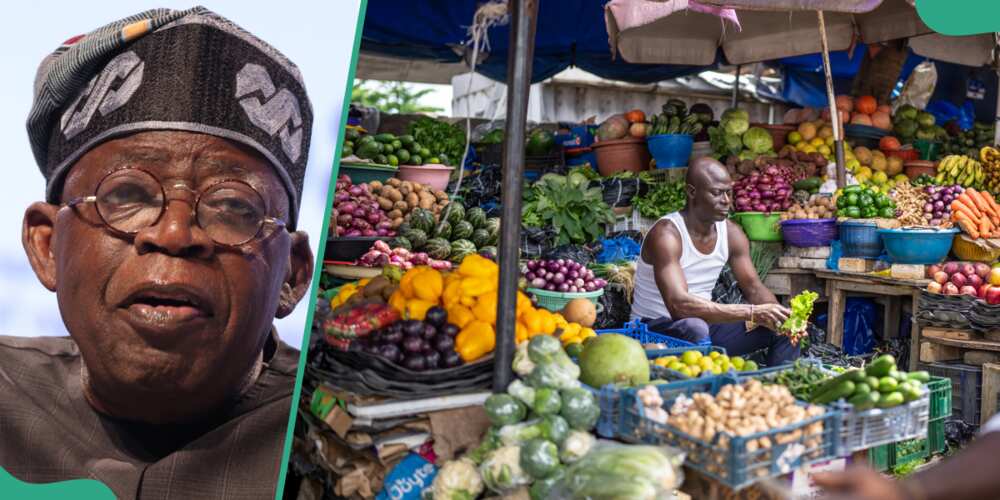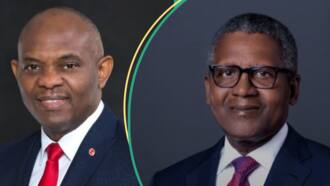[ad_1]
- In January, the United Nations (UN) estimated that more than 25 million people in Nigeria could face food insecurity in 2023 — a 47% increase from the 17 million people who were already at risk of going hungry
- This unpalatable development is mainly due to the ongoing insecurity, protracted conflicts, and the projected rise in food prices
- A journalist, Uloma Onyemachi, examined the impact of insecurity on Nigeria’s chance at food security and recommended what can be done to fix the problem
Legit.ng journalist Ridwan Adeola Yusuf has over 9-year-experience covering public journalism
FCT, Abuja – Amidst rising food prices, a journalist, Uloma Onyemachi, has identified palliative distribution as a valuable strategy for mitigating food insecurity in Nigeria.
Onyemachi is a writing fellow of African Liberty, a platform for advancing prosperity in Africa by promoting civil discussion and debate about social, economic, and world issues affecting people of the continent.

Read also
“Nigeria naira not as usual, setting up japa plans”: Nigerian banker earning 250k monthly laments

Source: Getty Images
Food insecurity: ‘Time for action is now’
In a recent op-ed sent to Legit.ng, Onyemachi said beyond actions by the Bola Tinubu administration, other institutional entities like non-governmental organisations and research centers, amongst others, also have a role to play in securing food self-sufficiency.
According to her, such interventions should include increased research and funding for agricultural initiatives and quality implementation.
Read her full article below:
Feeding a Nation: Unraveling Threats of Insecurity to Food Security
On July 13, 2023, Nigerian President Bola Tinubu declared a state of emergency on food security, pricing, and sustainability. Tinubu’s acknowledgment of the pressing need to address the country’s severe food scarcity is commendable. Still, root causes, such as insecurity, inadequate infrastructure hindering efficient distribution, and longstanding agricultural challenges persist. More recently, the fuel subsidy removal joins the list of concerns. Addressing these issues requires a security boost, palliative distribution, and minimum wage increment to achieve lasting solutions. Therefore, the government and other necessary parastatals must sit up and make these changes.
According to the International Monetary Fund, over 40 percent of Nigerians are now considered “food insecure.” The report says these people live below the poverty level due to insecurity, lack of quality data on crop yields, and unemployment, amongst other things. These alarming figures should serve as a wake-up call for the government to protect Nigerians.
Insecurity has played a significant role in hindering agricultural progress. Clashes between nomadic herders and farmers in the middle belt region of Nigeria, known as the nation’s food basket, have resulted in a devastating loss of lives and instilled fear among farmers. Any efforts to revitalize the agricultural industry will be futile unless the federal and state governments strengthen the nation’s security architecture.
Adequate and strategic funding of the security sector would provide the groundwork for considerable advances in the country’s security. It allows for the recruitment and training of more personnel, as well as the purchase of cutting-edge surveillance and communication technology. Developing well-equipped rapid response teams will also improve the security forces’ capacity. It will enable them to respond to developing conflicts swiftly.

Read also
Obi’s campaign director, Aisha Yesufu, knocks Alex Otti for lavishing N927m on refreshments, others
Establishing open communication channels and educational initiatives is essential to foster better synergy between the police and individuals. It helps equip communities to deal with issues related to insecurity. Security agencies should set up user-friendly systems like hotlines and smartphone applications where individuals can promptly report concerns to get timely assistance during crises. Concurrently, these security agencies should initiate educational activities for their personnel focusing on conflict resolution and security awareness. It will provide communities with the tools needed to handle issues proactively, enabling an ideal environment for farmers and herders to cohabit peacefully.
Palliative distribution is also a valuable strategy for mitigating food insecurity, and Vice President Kashim Shettima’s National Economic Council recommendations have underscored its importance. To make this approach truly effective, including local government representatives is imperative. Their knowledge, accessibility, and community trust are vital in reaching people in rural areas.
Beyond government action, other institutional entities like non-governmental bodies and research centers, amongst others, also have a role to play in securing food self-sufficiency. This intervention should include increased research and funding for agricultural initiatives and better implementation and monitoring of existing agricultural laws and acts, such as the Agricultural Credit Guarantee Scheme Fund. Empowering farmers with the necessary resources and support will enable them to engage in farming willingly and boost production.

Read also
FG picks Nigerian billionaires, Elumelu, Dangote, others to fight high mortality rate, malnutrition
Private institutions also have a vital role to play in addressing the crisis. These institutions can reduce total dependence on the government by actively assisting individuals in finding ways to provide for their families. For example, the Agricultural Society of Nigeria could offer farmers valuable information and professional training in new agricultural trends and profit-making. The organization could also provide monetary support through grants to empower communities to navigate the challenges posed by the crisis and foster resilience in the face of adversity. Moreover, long-term sustainability in the agricultural sector requires investment in security agencies, not just the police but local security like the vigilantes.
The time for action is now. Downplaying the severity of the crisis will only exacerbate the suffering of millions of Nigerians and potentially destabilize the nation further. The Nigerian government and its citizens must unite to achieve true food security and prosperity.
Uloma Onyemachi is a writing fellow of African Liberty
Scientist shares how to achieve ‘zero hunger’
In a piece of related article, Legit.ng reported that a scientist, Prince Abdulsalami Ladigbolu, revealed that women can play a pivotal role in achieving ‘zero hunger’ in Nigeria.
Ladigbolu stressed the need for President Tinubu to prioritise agricultural integration to curb the challenge of hunger.
Source: Legit.ng
[ad_2]
Source link







